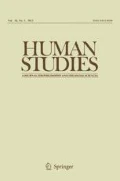Abstract
This analysis places the English translation of Heinrich Popitz’s (2017) Phenomena of Power: Authority, Domination, and Violence in the broader tradition of philosophical anthropology. It is argued anthropological arguments such as that offered by Popitz give insights not otherwise available to strict disciplinary inquiries. Poptiz’s discussion of power also suggests an important tension in philosophical anthropology. While Popitz contends power relations are “humanly produced realities” not “imposed by nature,” he nevertheless provides some support that physical and biological factors might contribute to an understanding of power. This discussion illustrates this tension using examples drawn from Popitz discussion of power, threats of violence, and the exercise of authority.
Similar content being viewed by others
Notes
This understanding Mead’s conception of self as purely social is derived from Mind, Self I and Society—a volume written from the notes of his students not by Mead.
References
Berger, P. L., & Luckmann, T. (1966). The social construction of reality: A treatise in the sociology of knowledge. New York: Doubleday.
Boehm, C. (2008). Purposive social selection and the evolution of human altruism. Cross-Cultural Research, 42(4), 319–352.
Bowles, S. (2009). Did warfare among ancestral hunter-gatherers affect the evolution of human social behaviors? Science, 324(5932), 1293–1298.
Buttel, F. H., Catton, W. R., Jr., & Dunlap, R. E. (1978). Environmental sociology: A new paradigm? The American Sociologist, 13(4), 252–256.
Catala, A., Mang, B., Wallis, L., & Huber, L. (2017). Dogs demonstrate perspective taking based on geometrical gaze following in a Guesser–Knower task. Animal Cognition, 20(4), 581–589. https://doi.org/10.1007/s10071-017-1082-x.
Check, E. (2006). Mix and match: the hunt for what makes us human. Nature, 443(7107), 8–9. https://doi.org/10.1038/443008a.
Gehlen, A. (1988). Man, his nature and place in the world. New York: Columbia University Press.
Lotz, C. (2005). From nature to culture? Diogenes and Philosophical anthropology. Human Studies, 28, 41–56.
Marx, K. (1977). Alienated labour. In D. McLellan (Ed.), Karl Marx: Selected writings (pp. 77–87). Oxford: Oxford University.
Mead, G. H. (1964a). The social self. In A. J. Reck (Ed.), Selected writings, George Herbert Mead. Chicago & New York: University of Chicago Press.
Mead, G. H. (Ed.). (1964b). The genesis of the self and social control, Edited by A. J. Reck. Chicago & New York: University of Chicago Press.
Mead, G. H. (Ed.). (1964c). A behavioristic account of the significant symbol, Edited by A. J. Reck. Chicago & New York: University of Chicago Press.
Mead, G. H. (1983). Cooley’s contribution to American social thought. In Human nature and the social order (Vol. XXXV, pp. 9–39). London: Routledge.
Mead, G. H., & Morris, C. W. (1934). Mind, self & society from the standpoint of a social behaviorist. Chicago: The University of Chicago Press.
Popitz, H. (2017). Phenomena of power: Authority, domination, and violence (G. Poggi, Trans.). New York: Columbia University Press.
ten Cate, C. (2017). Assessing the uniqueness of language: Animal grammatical abilities take center stage. Psychonomic Bulletin & Review, 24(1), 91–96. https://doi.org/10.3758/s13423-016-1091-9.
Tomasello, M. (2001). The cultural origins of human cognition. Boston: Harvard University Press.
Author information
Authors and Affiliations
Corresponding author
Rights and permissions
About this article
Cite this article
Williams, J. The Philosophical Anthropology of Heinrich Popitz. Hum Stud 41, 503–511 (2018). https://doi.org/10.1007/s10746-018-9466-8
Published:
Issue Date:
DOI: https://doi.org/10.1007/s10746-018-9466-8



